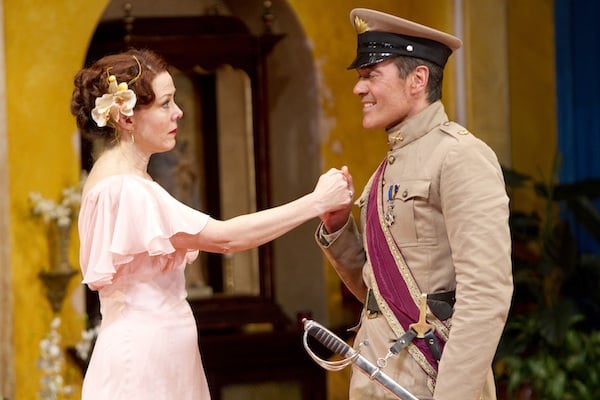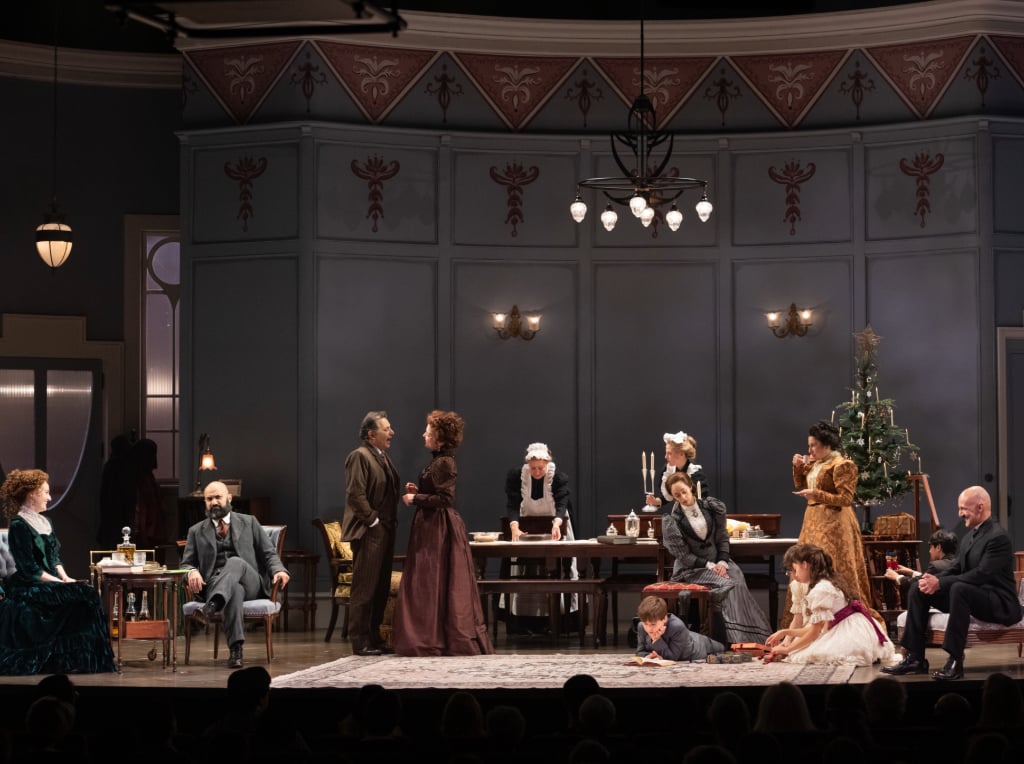Kathryn Meisle as Beatrice and Derek Smith as Benedick in the Shakespeare Theatre Company’s production of “Much Ado About Nothing,” directed by Ethan McSweeny. Photograph by Scott Suchman
☆☆☆ 1/2 out of four
Blame Kenneth Branagh for all the warmth, jollity, and gentleness people often associate with Much Ado About Nothing. Branagh’s 1993 adaptation of the play, set in the rolling hills of Messina (Tuscany), was such a charming, sumptuous film that the dark subject matter and crude sexual puns that punctuate the play’s light humor were almost entirely swept under the rug. Ethan McSweeny’s current production, playing at Shakespeare Theatre Company’s Sidney Harman Hall through January 1, is set in 1930s Cuba, which adds all the warmth of an exotic locale to a suitably religious and complex social hierarchy. Given what happens to poor Hero, one almost expects the female characters in Much Ado to be wearing burqas by act four, but since a production set in Kabul might be excessive, McSweeny’s choice is a clever one.
Given that this is feel-good holiday fare, McSweeny’s success in balancing the play’s romantic comedy with its less-sunny elements is even more commendable. The show opens on Lee Savage’s gorgeous set, a vast colonial house set on a sugarcane plantation. With wooden shutters stretching to the ceiling, terra-cotta-tiled floors, wrought-iron gates, and exotic flowers strewn about, the stage has so much historical charm it’s practically a vacation brochure. Leonato (Adrian Sparks), the master of the house, welcomes Don Pedro (David Emerson Toney) and his soldiers, who’ve recently been victorious in battle, which brings all the hormonal turmoil and romantic implications you’d expect from placing a troupe of military men in the home of several sheltered women. Particularly in the case of Hero (played gracefully by Kate Hurster*), Leonato’s innocent daughter, who quickly catches the eye of young upstart Claudio (Ryan Garbayo).
But the real Heroes (pun intended) of Much Ado are Beatrice and Benedick, the sharp-tongued, quick-quipping sworn enemies who spar eagerly each time they meet. As Beatrice, Kathryn Meisle is delightfully tart and almost unlikable, turning up her nose at every man who crosses her path. “She mocks all her wooers out of suit,” says Leonato to Don Pedro, who resolves to take the snooty Beatrice down a peg or two by having her fall in love with Benedick (Derek Smith), the most amiable misogynist ever to grace the stage. “Till all graces come in one woman, one woman shall not come in my grace,” declares Benedick, a sworn bachelor who doth protest too much. Both Meisle and Smith are more mature than some of their costars, which gives their characters an extra depth, especially with the indignities of the action McSweeny puts both of them through. Eavesdropping on a staged conversation about Beatrice’s love for him, Benedick is forced to crawl repeatedly around a fountain, while Beatrice is obliged to submerge herself completely to hear her side of the fiction.
Parts of this production are so physically comical that they border on slapstick, but still work remarkably well, even if the atmosphere occasionally becomes so jovial that it detracts from some of the sadder lines. When Hero is subjected to a vicious public lynching by Claudio, Don Pedro, and even her father, comic relief comes in the form of Dogberry (the ever-excellent Ted van Griethuysen), who scatters malapropisms like candy and proudly carries his not-insignificant heft across the stage. Kudos also goes to Floyd King as Verges, who fearlessly wields his ear trumpet like a weapon. The villain, of course, is Don John (Matthew Saldivar)—as sleazy as a used-car salesman and sneeringly Machiavellian. But as Claudio, Garbayo is almost as unsympathetic, soothing his wounded pride with acts of vicious cruelty. The telenovela-esque musical interludes between scenes only add to the amped-up drama.
This production’s appeal undeniably stems from its performances, which are almost universally strong, although Clint Ramos’s costumes and Savage’s set make it a visual treat, too (Ramos frequently dresses all the women in pink, in a not-too-subtle jab at the battle of the sexes). But as the wire-crossed lovers, Meisle and Smith deserve credit for conjuring an utterly believable romance. Their chemistry, even as enemies, is obvious, and it’s the sense of optimism their relationship offers that really makes Much Ado such a pleasing spectacle. Given how poorly the idealized romances fare, it’s heartening to believe in lovers who were frenemies first.
Much Ado About Nothing is at Shakespeare Theatre’s Sidney Harman Hall through January 1. Tickets ($20 to $105) are available through Shakespeare’s Web site.
*This piece originally said Colleen Delaney played the part of Hero. We apologize for any confusion.
















